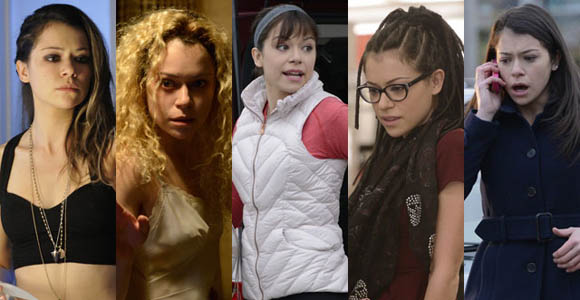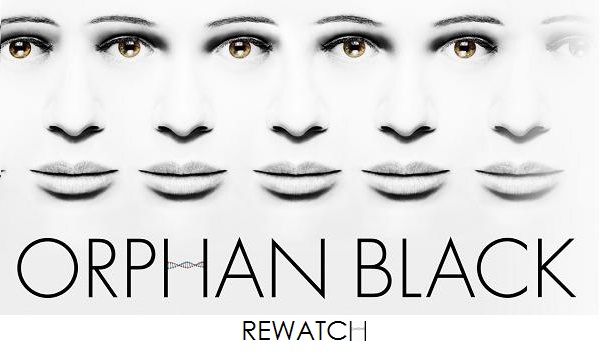When Orphan Black premiered in the Spring of 2013, it was to fairly little fanfare compared to many other debuting series. Sure there was some advertisements running on television, but nothing compared to say, the promotion for TNT’s Falling Skies. The lead actress, Tatiana Maslany, was very much an unknown actress and the series was one of the first original scripted series for BBC America, a channel mostly known for showing Doctor Who and other imported programs from the United Kingdom, as well as some other ephemera such as a television version of Chris Hardwick’s Nerdist podcast, cooking shows and re-runs of Star Trek: The Next Generation. (Copper is the network’s first original drama and from the few episodes I’ve seen, a quality program in its own right).
The folks behind Orphan Black have some experience in scripted television, including executive producers Ivan Scheenberg and David Fortier (best known for Being Erica); Graeme Manson (Flashpoint); and John Fawcett (Spartacus). The drama is co-created by Manson and Fawcett, with Manson also serving as writer and Fawcett as director. The show; however, is anchored by the breathtaking and stunning performances (yes, plural) of Tatiana Maslanay, but you’ll see more of that as the series progresses and a bit more below.
So in more ways than one, Orphan Black was working with a blank slate of expectations. I can’t quite say if that had an overall effect on my reaction to the show and the majority of viewers who’ve been singing its praises, but it might be safe to say few television channels could have pulled off this show. Certainly not one of the major networks, not a cable network like TNT or USA and frankly, this is a show that’s smarter than the majority of what’s being aired on the network formerly known as the SciFi Channel. Maybe the only channels that could have pulled off the show with its mix of powerful drama, adult edge, and riskiness were F/X or AMC. Suffice it to say, viewers might agree with me that BBC America and Orphan Black were a perfect match as two entities striving to prove themselves in the increasingly crowded television viewer’s time in an era some would agree is something of a new Golden Age for televised drama.
The show is currently available on home video (Blu-Ray & DVD), as well as On Demand through most cable companies. BBC America will be re-airing the show in sequence beginning September 14. As such, a new recap on Mondays after each “new” episode will be posted, beginning September 16, a week from the date of this post. As the series drew to a close and more viewers flocked to this show, the buzz was generating to the point that many have praised Maslany’s performance as the best on scripted television over the past year and worthy of not just Emmy award consideration, but an Emmy award win. Maslany’s performance has received a Critics’ Choice Television Award and TCA Award already this year. The whole cast is terrific, and though there are no real “A” list names in it, the actors/actresses are by no means inexperienced and the cast includes some relatively recognizable faces.
Like the best science fiction, science is an essential element to the show but doesn’t overshadow the storytelling or characters in any way. Of course cloning is a common trope in SF, but at least in filmed SF, this might be the best and most logical treatment of the inherit problems with clones I’ve viewed. Great SF (and science for that matter) doesn’t always offer the answers, but gives people questions to consider. Such is the case with Orphan Black.

Much of SF is male-centric, not so with Orphan Black. Each of the women Maslany portrays as the series progresses has a sense of power over herself, despite being manipulated from outside forces. These roles and their ‘base of power’ as characters does not come as reflection of the men in their lives.
Like many scripted Science Fiction shows these days, Orphan Black is filmed in Canada. Viewers will likely recognize some of the filming locales and definitely some of the actors and actresses. For me, it wasn’t initially clear in which city the show takes place. Especially in the first episode, the camera doesn’t settle on anything immediately identifiable (i.e. the names on the side of the police cars, street signs, etc) other than giving me the sense that “Hey, this could be any big North American city.”
Over the course of these ten episodes, themes of personal identity, freedom, the dangers benefits of science, among many others are touched upon not the least of which (unsurprisingly) is the ethics of human cloning. Throughout these ten episodes, the writing and the acting makes for a superb convergence of entertainment and thought provocation. With most of these ten episodes, any expectations viewers may have had from previous weeks’ episodes get crumpled up and tossed in the trash. I mean that in the best possible way—at least through the first season it seemed clear the writers have a plan, a long game if you will.
Part of what has made this show so enjoyable and smart is simply how seriously it takes itself. The primary players—Sarah, her foster brother Felix (Fee as she calls him), her foster mother Mrs. C., and Beth’s (the first clone we meet) lover Paul—all act logically and, for the most part, don’t play the part of idiot just to advance the plot. The writers and network weren’t afraid to push boundaries, and they trusted both the intelligence of their audience and the abilities of their actors.
I realize some folks are coming to this series for the first time so I’ll try to keep spoilers out of the posts, or at least to a minimum. That is, I’m not going to discuss elements revealed in episode 8 in the first episode, except for may be a note to remember a particular point.
I want to have fun with this, too so I’ll have a little tally at the end of each of these write-ups. Initially I’ll have the following, where appropriate:
Clone Count: Number of clones in the episode
Clone Total: Number of clones revealed to this point in the series.
Sexy Time: As I’ve intimated, this series pushes the boundaries in many ways, not the least of which is how the sex is depicted and how little clothing remains on the characters when they engage.
Hey, it’s that guy/gal! Viewers of science fiction and fantasy television and movies have become accustomed to how incestuous the field is. You’ll see some familiar faces as the show progresses.
Rob Bedford lives in NJ with his wife and dog. He reviews books and moderates forums at SFFWorld and runs a blog about stuff. He sometimes wonders if he is a clone, but shudders at the thought of multiple versions of him mucking up people’s lives.










